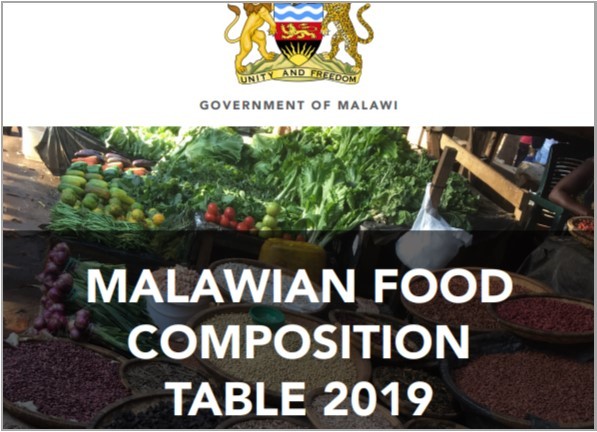Speeches Shim

Malawi Food Composition Table Released
On February 24, the U.S. government funded Feed the Future Innovation Lab for Nutrition in Malawi supported the release of Malawi’s first official national food composition table. The table describes the nutritive value of 316 locally produced and imported foods commonly consumed in the country. It captures information for 42 nutrient components, of which the source of data for 63 percent is information generated from local analyses of foods. Since May 2016, Lilongwe University of Agriculture and Natural resources has worked hand in hand with South African Food Data System (SAFOODS) to develop the Malawian food composition database through an extensive process of research, data gathering, and compilation, using the methodology endorsed by international organizations such as INFOODS and FAO. The development of the first national food composition table was one of three focal activities of the Feed the Future Innovation Lab for Nutrition in Malawi, with the overarching aim of building pre-service nutrition education and training capacity. The lab is an initiative of the USAID Bureau of Food Security and was implemented by the Friedman School of Nutrition Science and Policy at Tufts University. The dissemination event was also used to harness pivotal partnerships to build a comprehensive food composition program in Malawi.
Government of Malawi Creates New Ministry
The Government of Malawi (GOM) announced the creation of a new Ministry of Disaster Management Affairs and Public Events effective immediately. Previously known as the Department of Disaster Management Affairs (DODMA), the new Ministry is expected to serve as a platform for the GOM to respond following a disaster. Many speculate the motivation for creating this new Ministry may be to keep the resources of DODMA away from Saulos Chilima now that he returned as Vice President. The new minister is Mr. Everton Chimulirenji, the immediate former Vice President of the Republic of Malawi, who was ousted after the country's Constitutional Court reinstated Chilima following the nullification of the May 2019 elections results.
Responses to Food Insecurity and Vulnerability
In February, the Integrated Phase Classification for the severity of food emergencies determined that Balaka, Neno, Nsanje, Phalombe, Dedza, and Karonga districts had 15 percent or more of their population in the Crisis (Phase 3) category. WFP, with USAID and DFID funding, plans to reach 344,000 food insecure people in these six districts with cash-transfers valued at USD 30 (MK23,000). This includes the Horizontal Expansion of the Shock-Responsive Social Protection System in Balaka, where WFP is supporting the Government to leverage the Social Protection System to target 64,000 severely food insecure households not under the Social Cash Transfer Programme (SCTP). In addition, the Government is providing assistance to 105,000 people through their own system as part of the Vertical Expansion (top-up of MK23,000 to SCTP beneficiaries) in 4 districts (Balaka, Phalombe, Neno, and Nsanje). The Government also responded with one-off distributions in areas affected by flash floods in Karonga, Machinga, Nsanje, and Chikwawa. Pictured below are cash transfer activities in Nsanje.
Maize Grain Prices Continue to Rise
Average maize grain prices at the end of January 2020 reached MK314/kg according to both IFPRI and WFP monitoring reports. In the last three weeks, nominal maize grain prices have been relatively stable but remain elevated compared to five-year trends. The national average price is 84 percent higher than this same time last year and almost double the five-year average. The current price stability is likely attributed to expectations of the green harvest in the coming weeks coupled with the prospects of the second consecutive above-average cereal output in 2020 as a result of relatively good rainfall observed across the country. The high price of maize grain limits access to food for vulnerable households and negatively impacts food and nutrition security outcomes, making it a key concern of the Bureau of Humanitarian Assistance / Food For Peace. According to WFP, it is expected that grain prices will take a downward trend in the coming weeks, as households become less reliant on local markets and resort to consumption from their own production. More importantly, the anticipated prospects of a second consecutive above-average maize production year may induce big traders to offload any remaining grain from the 2018/2019 harvest onto the market.
The Forestry Act Amendment Passed
Developed with support from USAID, the amendment was passed by Parliament on February 14. The Bill amends the 1997 Forestry Act to better address deforestation. It acknowledges the growing number of forest plantations managed by the private sector through Public Private Partnerships, enables the GOM to collect more revenue from concession agreements, enhances fines, and allows officers to carry firearms. The Bill also incentivizes communities and the private sector to participate in forest co-management, regulates sustainable charcoal production with licensing, and endorses energy-saving technologies, including fuel-efficient cook stoves and liquid petroleum gas.

Comment
Make a general inquiry or suggest an improvement.